初一(七年級)上冊英語知識點:unit5-unit6,是由小編特整理的,主要包括句型、主格、句式、詞匯及相關的練習,適合新初一同學們學習,也適合教師教學使用,供大家參考!
Unit 5 Do you have a soccer ball?
詞匯:
1.球類名詞小結soccer ball英式足球 ping-pong ball乒乓球tennis網球volleyball排球basketball籃球
2.“球拍”的表達 tennis racket網球拍 ping-pong bat乒乓球拍
3.play + 名詞 結構的短語play sports參加體育運動play computer games玩電腦游戲
4.“play + 球類名詞”結構的短語 play ping-pong ball打乒乓球play tennis 打網球 play soccer踢足球 play volleyball打排球
5.sports club運動俱樂部 6.first name名 last name=family name姓
7.watch TV看電視 on TV在電視上,通過電視
8.常用的描述某物或某事的形容詞:interesting有趣的fun有趣的 relaxing輕松的 boring無聊的difficult困難的9.have a great sports collection有大量的體育收藏品 10.every day每天
句型: Do you have a TV? Yes, I do/No, I don’t.
Do they have a computer? Yes, they do./No, they don’t.
Does he have a tennis racket? Yes, he does./No, he doesn’t.
Does she have a soccer ball? Yes, she does./No, she doesn’t.
Does he have a ping-pang ball? Yes, he does./No, he doesn’t.
Let’s play soccer. Let me help you.
I don’t have a soccer ball. That sounds good.
語法:1,句中不含be(am,is,are)動詞的 一般疑問句的變法。 也就是說句中謂語動詞是實義動詞時,要變為一般疑問句,在句首加do/does(當主語是第三人稱單數的時候用does),第一人稱變第二人稱,動詞變原形其他的語序不變。I have a computer. – Do you have a computer? She likes playing ping-pang.- Does she like playing ping-pang.肯定回答用yes, 主語+do/does.否定回答用No,主語+don’t/doesn’t.
2一般句子中當主語是第三人稱單數的時候,謂語動詞要起變化。具體的變化為:一般情況加s, know-knows, 以s,x,ch,sh,o結尾的加es, teach-teaches, go-goes, 以輔音字母加y結尾,把y改為i, 再加es study-studies
3, do/does 叫做助動詞(語法需要加上去翻譯部出來的動詞)時,后面接動詞原形,
Does he like reading? She doesn’t like reading. She doesn’t do her homework.
但是如果做實義動詞(能翻譯出來意思的動詞)呢,遇到主語第三人稱單數就要起變化。
She does her homework.
4,have的第三人稱單數為 has.
5, let sb do sth 讓某人做某事 (sb代表人,如果是代詞用賓格,do代表動詞原形)
6,play+球類 表示“踢,打,玩......” play football
play+the+樂器 表示“彈奏……樂器” play the piano
句式:1.Do引導的一般疑問句 —Do you have a TV?—Yes,I do. / No,I don’t.—Does he have a tennis racket? —Yes,he does. / No,he doesn’t.
2.祈使句——Let’s do sth. Let’s play ping-pong.
3.主系表結構——主語 + 系動詞 + 形容詞 That sounds good.
1) _______his parents _______(have) a ping-pang ball?
-----Yes,________________.
2) _________our English teacher ______(have) a basketball?
-------No,_________________.
3) My friend ____________(看電視) every day.
4) ______(他弟弟)______(有)many__________(sport)_________(club).
5)You ___________( not ,have) ______(sport) every day.
6)She ___________( not,watch TV) in the evening. She _________(study) English every day.
7)Let’s_________(play) volleyball with ______(she).
She ________(play) every day.
8)Let your sisiter _______(play) the computer game.
9)We _________(have) a __________(sport)_____________(collect).
It_________(be)__________(interest).
10)My parent __________(not like)__________(play)________(sport).
Because it’s _____________(bore)
11._________(他們)___________(not play) sports every day.
_____(they) only _____(watch)_____(they)____(inonwithby)TV.
12.-------_______(let)______(he)_____(play)_______(theaan) baseball.
--------_________(sound) good.
Unit 6 Do you like bananas?
詞匯:
1.水果banana香蕉 orange橙子strawberry草莓 pear梨 apple蘋果
2.蔬菜 tomato西紅柿 carrot胡蘿卜broccoli花椰菜
3.食品 hamburger漢堡包 French fries薯條ice cream冰淇淋
salad沙拉chicken雞肉 egg雞蛋
4.countable nouns可數名詞 uncountable nouns不可數名詞
5.running star賽跑明星
6.lots of = a lot of非常多,很多(后面既可跟可數名詞復數,也可跟不可數名詞)
7.healthy food健康食品
8. have sth. for breakfast/lunch/dinner/dessert早餐/中餐/晚餐/甜點吃……
句型:Do you like salad? Yes, I do./No, I don’t.
Does he like pears? Yes, he does./No, he doesn’t.
I like oranges. I don’t like oranges.
Running star eats lots of healthy food.
語法:句中謂語動詞是實義動詞的陳述句,變否定形式在實義動詞前加don’tdoesn’t(主語是第三人稱單數時用doesn’t’).
like doing sth/like to do sth 喜歡做某事
I like swimming. She likes to eat hamburgers.
句式:
1.詢問某人是否喜歡某物的句型及答語
—Do/Does sb. like sth.? —Yes,sb. do/does. —No,sb. don’t/doesn’t.
—Do you like salad?—Yes,I do./ No,I don’t.
—Does he like pears?—Yes,he does. / No,he doesn’t.
2.祈使句——Let’s do sth. Let’s have ice cream.
3.一般現在時的肯定句及否定句 I like oranges. I don’t like bananas.
They like salad. They don’t like broccoli.
She likes bananas. She doesn’t like ice cream.
更多精彩資訊請關注查字典資訊網,我們將持續為您更新最新資訊!
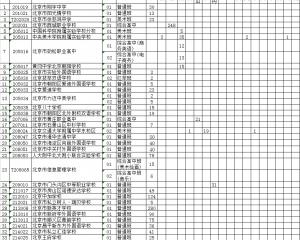 2020年北京市中招參加補錄的學校名單2020-08-19
2020年北京市中招參加補錄的學校名單2020-08-19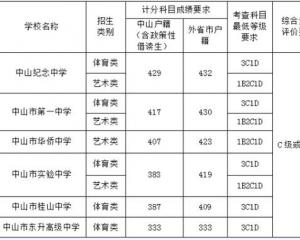 中山2018年中考錄取分數線已公布2018-08-24
中山2018年中考錄取分數線已公布2018-08-24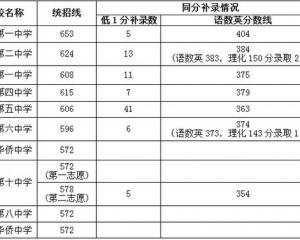 2018年福建莆田中考分數線正式公布2018-08-24
2018年福建莆田中考分數線正式公布2018-08-24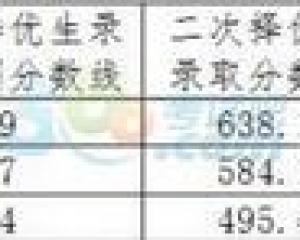 2018年遼寧本溪中考分數線已公布2018-08-23
2018年遼寧本溪中考分數線已公布2018-08-23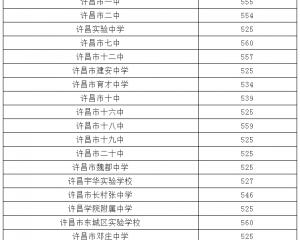 2018年河南許昌中考分數線已公布2018-08-16
2018年河南許昌中考分數線已公布2018-08-16